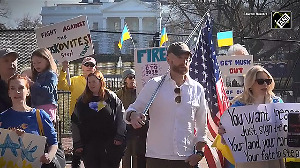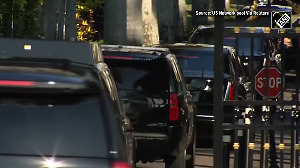China continues to be critical of Prime Minister Stephen Harper having received the Dalai Lama in his House of Commons office in Ottawa on Monday, but that doesn't deter Canada from going all out in support of human rights, rule of law and justice in Tibet and elsewhere.
"It was a historic visit to Canada and Prime Minister Harper and His Holiness met for 40 minutes," said Jason Kenney, secretary of state for multiculturalism, also a close adviser to Harper.
In an exclusive interview with rediff.com on Wednesday, he said, "I myself had a (one to one) half hour meeting with the Dalai Lama, who's a distinguished and universally respected world figure."
He's now an honorary Canadian citizen and he calls Canada his second home, Kenney said.
While in Ottawa for 3 days, the Dalai Lama was also received by Governor-General Michaelle Jean.
When asked whether he was received as head of state, Kenney said, "Not formally, but effectively yes."
During his meeting with Harper, the Dalai Lama reportedly asked the Canadian prime minister to take more of his Tibetan people into Canada, people who are currently living as refugees in India and Nepal.
Kenney wouldn't comment on what transpired during their private meeting. He only said, "The Dalai Lama would appreciate if we can do anything to welcome more people from his community and certainly we will take a look at that."
A spokesman from the Citizenship and Immigration reportedly said the United Nations High Commission for Refugees doesn't view Tibetans as a population in need of resettlement because they are not facing persecution in India.
Kenney said Tibetans "are not nliving as refugees in India. India is a great democracy and both His Holiness and others have pointed out that India has been very generous and has taken tens of thousands of Tibetans, but India has limited capacity to accommodate the Tibetan refugee population."
The fact that for the first time any Canadian prime minister officially received the Dalai Lama should signify some change in Canada's foreign policy vis-à-vis China.
Kenney was hesitant responding to this question as that was within the jurisdiction of the Minister for Foreign Affairs Maxime Bernier.
However, after a great deal of thought and in very guarded language, Kenney said, "There has been a great deal of commentary on the fact that our government lays emphasis on the promotion of human rights and democracy as our foreign policy. Prime Minister Harper himself has been frank about his view."
He was very clear in his mind that Canada could "Pursue its commercial interests without diminishing our belief in fundamental values and human rights and rule of law."
That, Kenney noted, "is what the Dalai Lama actually represents" and so, "we can advance human rights without hurting our interests economically."
According to him, during the 21 months since the Tories formed the government "exports to China have increased by 27 percent. Those exports were actually down, on the decline under the Liberal government."
"We have also seen China's tourism to Canada increase by 15 percent, all of which would seem to confirm the prime minister's statement that our commercial interests would not be hurt by our talking about the human rights," Kenney said.
However, some analysts are concerned that earlier such strong statements from China denouncing Canada's policy have not been made.
"In a formal and concrete way our government places a great deal of emphasis on human rights in China and elsewhere and this visit (of the Dalai lama) was more than symbolic -- it is symbolic but obviously also indicates Canada's belief in those values," Kenney explained.
In this regard the question raised was, if a situation arises where Ottawa would have to choose trade or human rights, what would be their choice?
Kenney unhesitatingly responded, "I certainly believe human rights would take precedence over other concerns."
It is widely known that earlier, after he had to leave Tibet with his people in 1959, the Dalai Lama always demanded independence for Tibet.
However, during the last 20 years or so, he has started talking about autonomy so that the Tibetans can practice their own religion, their culture, their language and traditions.
"We have noticed this and it is a significant change in his stand," said Kenney. "He emphasized that in his talk with the Canadian Parliamentarians," Kennay added.
Kenney said for changing his demands, the Dalai Lama "has been criticised by members of his own family for merely advocating cultural autonomy. And younger Tibetans, he says, don't agree with him on this point."
Since Kenney met him separately he knows the Dalai Lama's concerns as to what would happen when he dies: "If the question of Tibet is not resolved before he dies, the Dalai Lama is concerned that there might be a more extreme position taken by many militants in the Tibetan community.
So, he says, he's seeking reconciliation within the framework of the Chinese Constitution. He's seeking cultural autonomy to allow Tibetans to protect their religion, language and culture and he said that he started articulating this position some 20 years ago."
The Canada-Tibet committee recently discovered an archival document of 1950 that expresses doubts about China's claim over Tibet.
"But Pierre Trudeau sent a letter on this matter to the Chinese government in 1971 to take note of Chinese claims to sovereignty, but didn't take a position on it," Kenney said.
"Same is the position of our government," he indicated.
"Our position on this matter hasn't changed. It is consistent with the position which takes note of the Chinese claim on sovereignty. This government is not changing its China policy," he emphasised.
Photograph: Prime Minister's Office







 © 2025
© 2025